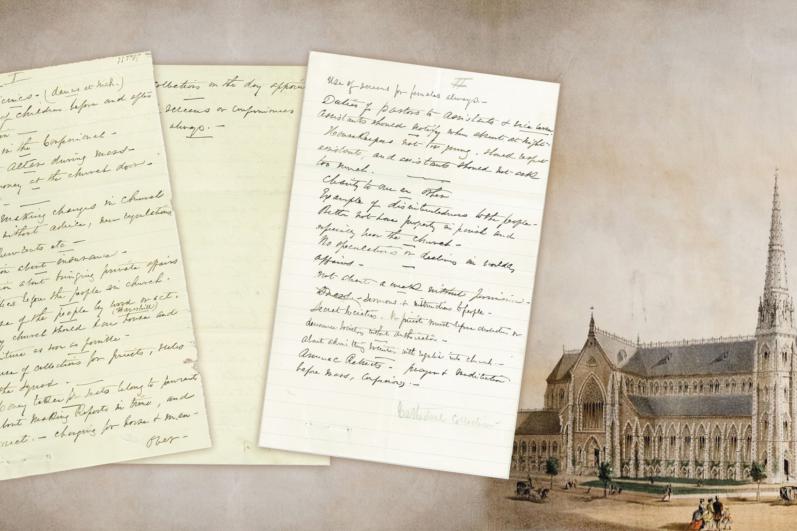The overlooked third diocesan synod of 1872
One hundred-fifty years ago this month, priests of the Diocese of Boston convened at the Blessed Sacrament Chapel of the yet incomplete Cathedral of the Holy Cross on Washington Street for the third diocesan synod.
This column has previously discussed the first two diocesan synods. To review, a synod is the meeting of priests in the diocese, called by the bishop to obtain their counsel through the discussion and debate of various issues. At these early synods, topics usually related to rules or administrative procedures in the diocese rather than theological debates.
The first synod took place over several days of August 1842, when the 30 priests of the diocese gathered at the Cathedral of the Holy Cross on Franklin Street to review and vote upon the implementation of decrees passed by the first four Provincial Councils of Baltimore (1829, 1833, 1837, and 1840).
The second synod took place in November 1868 at the House of the Angel Guardian and is said to "have furnished the ground plan and a great part of the substance of all our later synodal legislation." It was intended to approve recommendations of the Second Plenary Council of Baltimore held two years prior, "by far the most important assembly that had been held in the American Church down to that time." The synod resulted in the approval of 228 decrees by the 140 priests who assembled.
The third synod of the Diocese of Boston, according to the "History of the Archdiocese of Boston," appears to have been largely overlooked by historians. A subsequent synod in 1879 is often called the third but is actually the fourth to have taken place.
One reason the 1872 meeting may have been overlooked, they claim, is the lack of documentation. It does not appear to have yielded any published rules or procedures that would have been reviewed and voted into effect as with the first two synods.
There is one reference to the synod in The Pilot from the time, a small notice published June 1, 1872, and the full feature simply reads "Diocesan Synod in Boston -- The clergy of the Diocese of Boston met in Synod on Tuesday 21st of May, at the new Cathedral chapel, under the presidence of the Right Rev. Bishop."
Similarly brief is the entry in the Episcopal Register, where sacraments administered by the diocesan bishop are recorded, which, on May 25, 1872, reads "The III Diocesan Synod was held today. 135 priests were present in the chapel of the B. Sacrament. They dined at 1 o'clock in the hall under the chapel." In the entry for what should have been the fourth synod in 1879, "4th" was crossed out and "3rd" entered in its place, though it is unclear if this was done at the time of the original entry.
The bishops' journal, a day-by-day account of the bishops' activities, does not have an entry on this date, though, by this time entries were becoming less frequent and the practice of keeping a journal would soon cease altogether.
The best source appears in the Archbishop John J. Williams papers, where on three small pages he outlined the agenda for the synod.
Upon reviewing the list, some of it reads like a headmaster's list of common infractions, Bishop Williams taking up this role and his priests that of the students. Examples include urging punctuality in the confessional, not leaving the altar during Mass, not making changes to a church or rectory without advice, not showing disinterestedness to parishioners, not owning personal property within one's own parish, not speculating or dealing in worldly affairs, and not sharing private affairs or political views in the church.
Some were more administrative in nature, including topics such as fairs, picnics, and dances; "taking money at the church door -- or tickets;" raising pew rents; and admitting societies with regalia into the church.
Among the more intriguing are "abuse of the people by word or act (Haverhill)" and making sure housekeepers are not too young, that they be respectful of assistant pastors, but also that the assistants not ask too much of hem.
It may be that this synod was overlooked because, based on what we can infer from this source, it focused on conduct and administration of pastors and church administration rather than larger issues pertaining to the diocese or Catholic Church in the United States. There had been a Provincial Council in Baltimore in 1869, so it is possible that some of the same issues were discussed, though no evidence of this exists in the archive. There had also been a Plenary Council in Baltimore in 1866, but the decrees took time to be approved by Rome and were not voted upon until the next synod in 1879.
- Thomas Lester is the archivist of the Archdiocese of Boston.



















